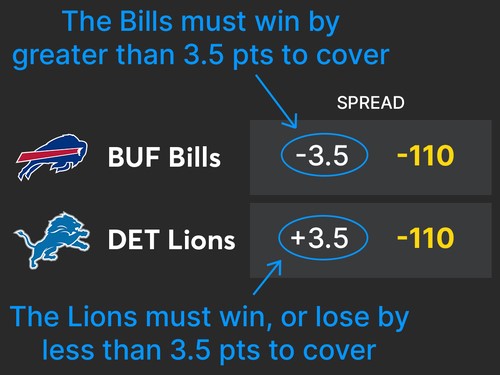In sports betting, understanding the spread is a game-changer for both casual bettors and seasoned pros. This concept, often referred to as the point spread, isn’t just about who wins or loses; it’s about how a game unfolds and by how much. Mastering the spread can turn a basic bet into a strategic play, helping you make more informed decisions and potentially boosting your winnings. Whether you’re cheering for an underdog or backing a heavy favorite, grasping what the spread means can be the edge you need to outsmart the odds and maximize your success.

Spread in sports betting: the essence
The spread in sports betting is like the great equalizer, leveling the playing field between teams of differing strengths and giving every bet a thrilling twist. In essence, it sets a margin by which a favored team must win or the underdog must avoid losing to cover the bet, adding layers of strategy and excitement. Instead of simply betting on who wins, you’re engaging with the “by how much” aspect, turning every point into a potential game-changer. Betting on the spread is like stepping onto a seesaw, where you weigh risk and reward and stay on edge until the final whistle. Grasping in sports betting what is the spread isn’t just about placing wagers; it’s about playing the game within the game, making you a more strategic and informed bettor.
How the Spread Works in Sports Betting
The spread sets a margin that the favored team must beat to cover the bet, while the underdog just needs to stay within that margin or pull off an upset. This isn’t just about predicting who wins; it’s about guessing the scale of their victory or resilience of their fight. Grasping in sports betting what is the spread shifts every game from a simple win-or-lose outcome to a nail-biting battle of precision and strategy. Every second counts, every play matters, and every decision could be the edge you need.
Advantages of Spread Betting
Spread betting comes with its own unique set of perks, making it a favorite among savvy sports bettors. In sports betting, understanding what the spread is can unlock more strategic opportunities compared to just straight-up bets. It’s all about flexibility and leveling the odds between mismatched teams. Instead of simply rooting for a win, you can bet on how much a team will win or lose by, opening up new ways to profit even when the underdog fights hard but falls short. Think of it like a balancing act—every point matters, and every score could swing your fortune.
Disadvantages of Spread Betting
Spread betting has its downsides, and it’s important to know what you’re getting into before diving in. In sports betting, understanding what the spread is can feel like a double-edged sword. Sure, it levels the playing field, but it also adds complexity and risk. Unlike moneyline bets, covering the spread means you need more than just a win; your team has to meet a margin. That means even if your favorite wins the game, they could still “lose” your bet if they don’t cover. The pressure on every point, basket, or goal is intense, and the juice—those small fees sportsbooks take—can eat into your profits if you’re not careful. Spread betting is thrilling but can easily lead to losses if you’re not strategic and precise.
Spread betting odds

In sports betting, understanding what the spread is goes hand-in-hand with grasping spread betting odds. Say there’s a football game where Team A is favored at -7.5 against Team B. This means Team A must win by at least 8 points to cover the spread. If they win 24-17, you win your bet, but if they only win 24-20, they didn’t cover the spread, and you lose. The odds often come with a standard -110, meaning you need to bet $110 to win $100. Spread odds can tilt a game’s thrill level up a notch, but every half-point matters, making every second a potential game-changer.
What Sports Are Popular for Spread Betting?
In sports betting, understanding what the spread is can open up new dimensions of excitement across a variety of sports. Football and basketball are the heavy hitters when it comes to spread betting because of their high-scoring nature and fast-paced action. In football, spreads can turn games into nail-biters as every touchdown or field goal can sway a bet. Basketball is all about the swings, with spreads often changing play-by-play as teams race up and down the court. Baseball, soccer, and even hockey also get their moments with adjusted spreads like run lines or puck lines, giving bettors a chance to wager beyond simple wins and losses.
Types of Spread Betting

In sports betting, understanding what the spread is means knowing there are different ways to play the game. Spread betting goes beyond just point spreads and opens up a variety of options. Here are some common types:
- Point Spread Betting: The classic version where teams are handicapped by a set number of points. The favorite must win by more, while the underdog can win outright or lose by less.
- Total Spread (Over/Under): Instead of betting on who wins, you wager on whether the total score of both teams will be over or under a given number.
- Run Line (Baseball): A variation of the spread, usually set at 1.5 runs, making every pitch and hit more intense.
- Puck Line (Hockey): Similar to the run line, typically at 1.5 goals, bringing an extra edge to every goal scored.
- Alternate Spread: Bettors can pick different spreads with varying odds, either increasing risk or enhancing payouts.
Each type cranks up the strategy and excitement, making every bet a more immersive experience.
Spread Betting Strategies to Win
In sports betting, understanding what the spread is can be the first step toward building a winning strategy. One popular approach is line shopping, where you compare spreads across different sportsbooks to find the most favorable odds, squeezing every bit of value from your bet. Another key tactic is fading the public, which means betting against the popular pick. When everyone piles on one side, sportsbooks often adjust the spread, creating value for those brave enough to zig when everyone else zags. Timing your bets can also be crucial; early lines sometimes offer value before they shift due to heavy action. Finally, focus on key numbers, especially in football, where spreads often land around common margins like 3 or 7 points, making even a half-point shift a big deal. Winning isn’t just about picking teams; it’s about playing the odds like a chess master, one move ahead.
How to Minimize Risks in Spread Betting

In sports betting, understanding what the spread is gives you an edge, but minimizing risks can make or break your long-term game. One solid approach is bankroll management—only bet a small percentage of your total funds on each spread bet to avoid going broke on a bad day. Diversifying your bets across multiple games, instead of going all-in on one, reduces your exposure too. Stay informed by researching stats, injuries, and even weather conditions; knowledge turns guesswork into strategy. Betting with discipline helps, so avoid chasing losses because desperation clouds judgment faster than a losing streak. Hedging bets when possible—like placing a smaller bet on the opposing side if odds shift—can also cut losses. Smart betting isn’t about being fearless; it’s about calculating every move like a cautious gambler at the table, ready to walk away a winner.
Mastering the spread in sports betting can transform your wagering approach from a casual pastime into a strategic pursuit. By understanding how point spreads shape bets and influence odds, you gain the ability to spot opportunities, make more calculated decisions, and elevate your game. This key concept goes beyond simply picking winners—it empowers you to make every wager with greater purpose and insight.
